Minimalism can greatly improve your mental health by reducing clutter and stress in your life. By prioritizing what's truly important, you can gain mental clarity that allows you to focus on personal goals and relationships. A simplified environment fosters emotional well-being and enhances creativity, while mindful consumption promotes gratitude. As you embrace less materialism, you'll find greater financial security and a more fulfilling lifestyle. Discover how adopting this mindset can transform your well-being even further.
Key Takeaways
- Minimalism reduces physical clutter, leading to lower stress and anxiety levels in everyday life.
- A simplified environment enhances mental clarity, allowing for better focus on personal goals and relationships.
- Mindful consumption fosters gratitude and appreciation, promoting a positive mental outlook.
- Decluttering creates a peaceful space, which is linked to decreased depression and improved emotional well-being.
- Minimalism encourages intentional living, aligning actions with true values and enhancing overall life satisfaction.
Understanding Minimalism and Its Benefits
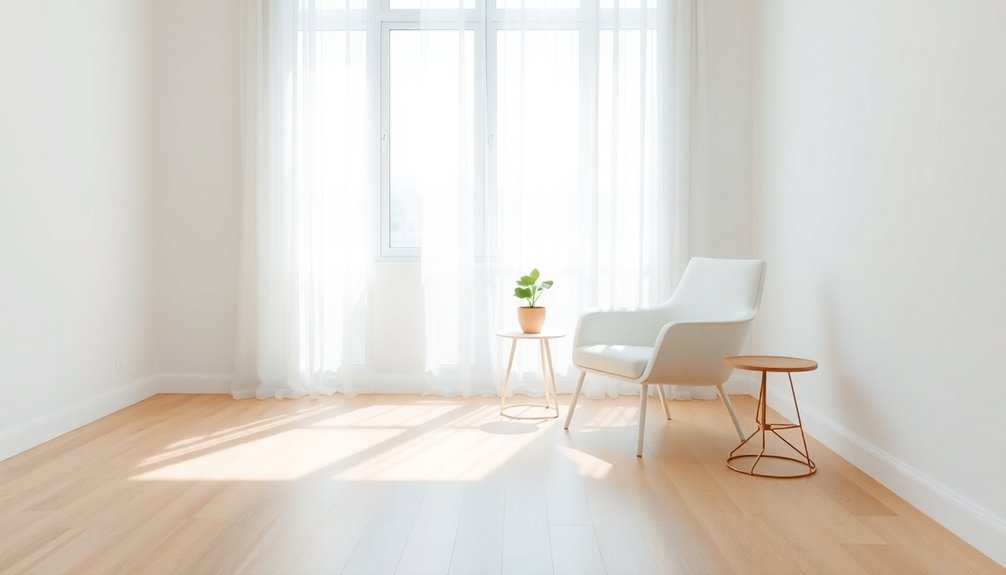
When you embrace minimalism, you're choosing a lifestyle that prioritizes what truly matters in your life.
This minimalist lifestyle fosters mental well-being by helping you reduce stress and eliminate mental clutter. You start to prioritize the important things, like nurturing relationships and meaningful experiences, which greatly enhances your overall well-being.
Living in an organized, clutter-free environment allows for greater clarity, giving you the freedom and time to focus on personal growth.
Studies show that this shift not only decreases anxiety but also boosts happiness and life satisfaction. Additionally, adopting sustainable habits can further enhance your mental health by promoting a sense of purpose and connection to the world around you.
The Negative Impact of Consumerism on Mental Health
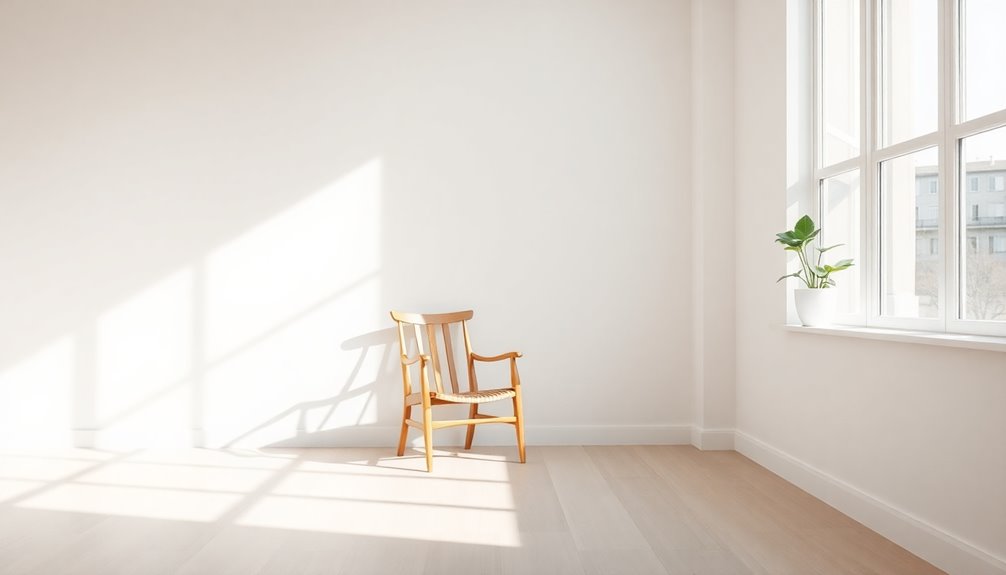
Consumerism can greatly undermine your mental health, often leading to feelings of stress and dissatisfaction. The relentless pursuit of material possessions creates mental clutter, making it harder to find peace and balance in your life.
Consumerism erodes mental health, fueling stress and discontent while complicating the search for peace and balance.
- Higher levels of financial debt and environmental neglect
- Increased stress and anxiety from maintaining excess items
- Feelings of guilt over unused goods and clutter
- Isolation from meaningful relationships due to consumer-driven lifestyles
These factors highlight the negative impact of consumerism on your personal well-being. Embracing a minimalistic lifestyle can help you reduce stress and refocus on what truly matters, ultimately improving your mental health. Studies show that individuals with high materialism report lower happiness levels and higher rates of depression.
How Minimalism Can Enhance Your Mental Well-Being
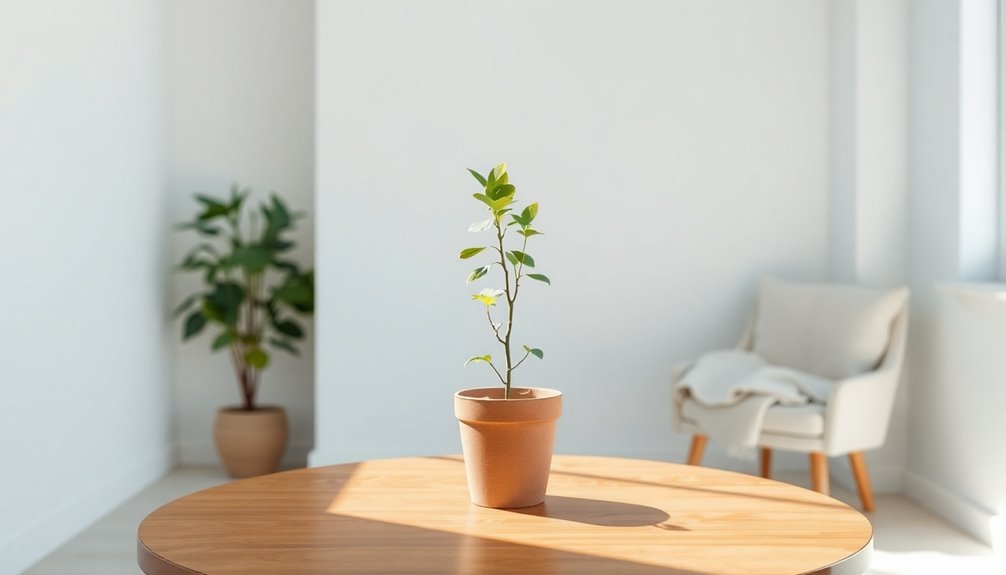
Shifting away from the burdens of consumerism opens the door to a more fulfilling lifestyle through minimalism.
By reducing physical clutter, you can greatly lower your stress and anxiety levels, leading to improved emotional health and mental well-being.
With a clearer space, you gain mental clarity, allowing you to focus on what truly matters—your personal goals and meaningful relationships.
Embracing minimalism encourages mindful consumption, which helps you appreciate simple pleasures and fosters gratitude.
This shift not only enhances your relationships but also cultivates a deeper sense of fulfillment.
As distractions fade, you'll find that your emotional resilience strengthens, empowering you to lead a more balanced and joyful life.
Additionally, practicing minimalism can lead to increased astrological compatibility in your relationships, as you prioritize meaningful connections over material possessions.
Minimalism truly transforms how you approach your overall well-being.
Five Ways Minimalism Improves Mental Health
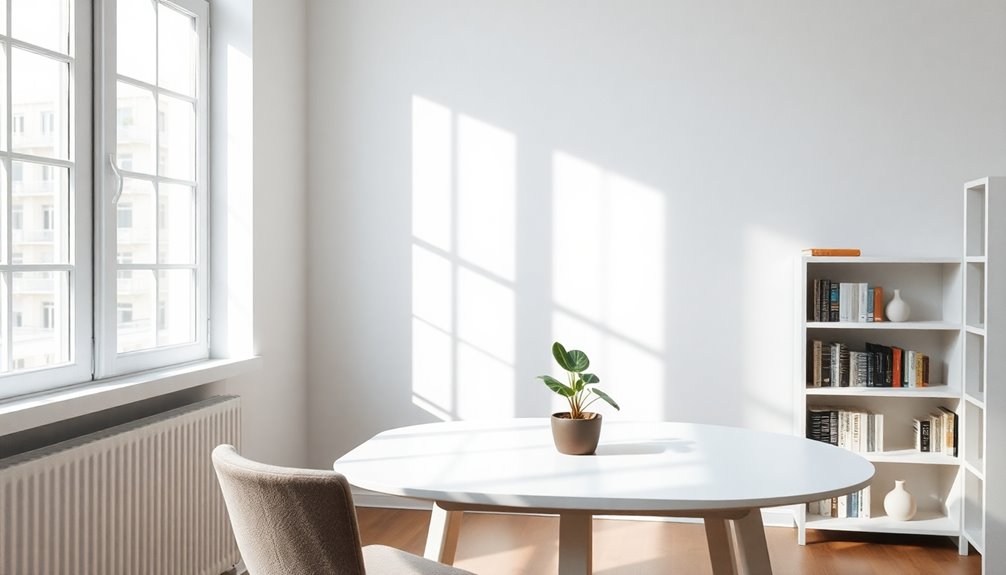
Embracing minimalism can profoundly enhance your mental health in various ways. By letting go of excess, you create a less cluttered environment that promotes a clearer and more organized mind.
Here are five ways minimalism can improve your mental well-being:
- Reduced stress and anxiety: A simplified space fosters emotional well-being and a sense of peace.
- Fewer distractions: Focusing on what's important boosts productivity and engagement in meaningful activities.
- Mindful spending: Minimalism encourages financial security, reducing materialism and stress.
- Deeper connections: Shifting focus from possessions to personal experiences combats loneliness.
- Enhanced creativity: By decluttering your environment, you free up mental space for transformative possibilities that encourage innovative thinking and problem-solving.
The Role of Decluttering in Mental Clarity
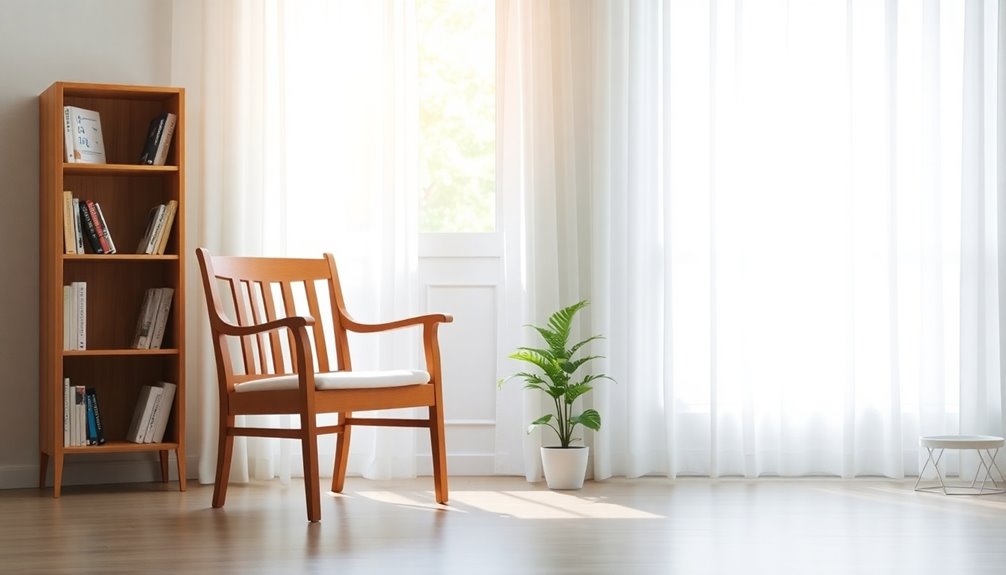
While it might seem intimidating at first, decluttering plays an essential role in achieving mental clarity. By reducing physical clutter, you lower stress levels, creating a more peaceful and organized living space.
Research shows that organized homes correlate with decreased feelings of depression, enhancing your overall mental well-being. When you remove unnecessary items, you gain mental freedom, allowing for improved focus on what truly matters in your life.
Organized spaces lead to reduced depression and enhanced mental well-being, fostering focus on what truly matters.
This process fosters clarity of mind, lifting the mental fog that clutter creates. Regular decluttering encourages self-reflection and promotes intentional living, helping you align your possessions with your true values and goals. Additionally, embracing mindful consumption can further enhance your emotional well-being by fostering a deeper appreciation for quality over quantity in your possessions.
Ultimately, this journey towards a clutter-free environment leads to greater peace and fulfillment in your daily life.
Embracing a Minimalist Mindset for a Fulfilling Life
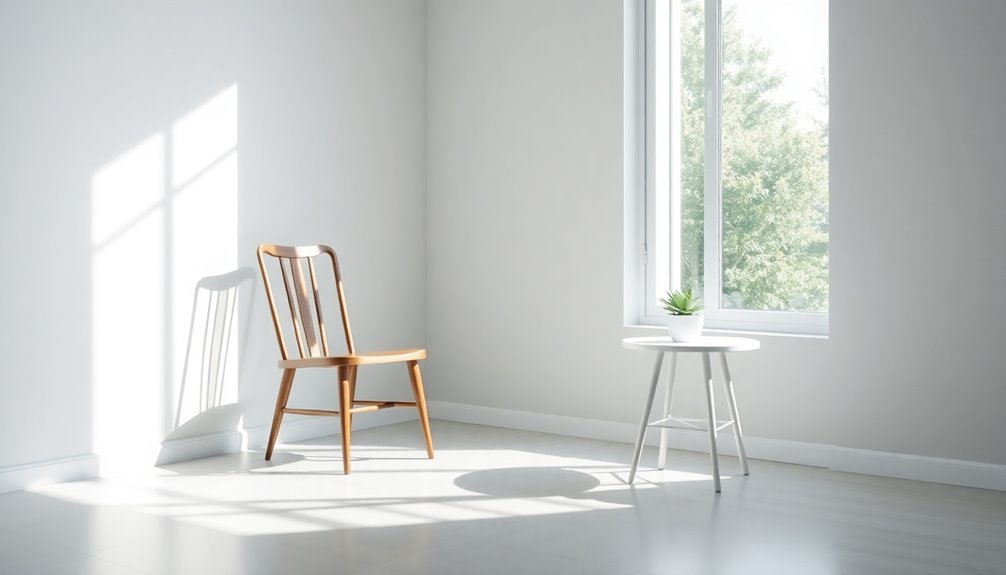
When you adopt a minimalist mindset, you prioritize what truly matters, paving the way for a more fulfilling life. By focusing on the important aspects of your life, you enhance your mental health and happiness.
Embracing minimalism fosters clarity and gratitude, allowing you to appreciate what you already have. As you engage in intentional decluttering, you create a serene environment that aligns with your core values.
- Simplified choices lead to deeper self-reflection
- Reduced distractions help you focus on meaningful relationships
- Enhanced emotional positivity through appreciation
- Increased sense of control and autonomy
This approach not only promotes fulfillment but also supports ongoing mental wellness, enabling you to live a life rich in purpose and joy. Additionally, it has been shown that positive thinking plays a crucial role in enhancing mental well-being and resilience.
Frequently Asked Questions
How Does Minimalism Affect the Brain?
Minimalism affects your brain by reducing mental clutter, which can lead to lower stress and anxiety levels.
When you simplify your surroundings, you stimulate your brain's reward pathways, creating feelings of accomplishment.
This lifestyle encourages mindfulness, allowing you to focus on meaningful tasks and experiences instead of distractions.
As you prioritize relationships and experiences, you enhance your emotional connections, ultimately promoting a clearer mind and greater overall well-being.
How Decluttering Helps Your Mental Health?
When you begin the journey of decluttering, you're not just tidying up; you're inviting a sense of calm into your life.
As you clear out physical space, you'll notice a revitalizing clarity in your mind, making decision-making simpler and less stressful.
This process allows you to reconnect with what truly matters, lifting the mental fog and fostering personal growth.
Ultimately, letting go of excess enhances your well-being and enriches your experiences.
How Is Minimalism a Coping Mechanism?
Minimalism's a powerful coping mechanism because it helps you simplify your life.
By reducing physical clutter, you create a serene environment that lowers stress and anxiety. It encourages you to focus on what truly matters, allowing for mindful consumption and informed choices.
As you declutter, you experience emotional relief and a sense of accomplishment. This shift in focus from possessions to meaningful experiences nurtures your relationships and enhances your overall well-being.
What Are the Benefits of Minimalism?
Ah, minimalism—the art of living with less so you can truly savor the joy of owning a single spoon!
Embracing minimalism brings clarity to your life, allowing you to focus on what truly matters. You'll find financial security by curbing impulse buys and decluttering your space reduces stress.
Plus, ditching excess fosters meaningful connections with others, transforming relationships from superficial to substantial.
Ultimately, you'll discover a sense of fulfillment that stuff simply can't provide.
Conclusion
In embracing minimalism, you're not just clearing physical clutter; you're also making space for mental clarity and peace. By shedding unnecessary distractions and focusing on what truly matters, you can brighten your outlook on life. Remember, less really is more. When you prioritize experiences over possessions, you'll find yourself living more intentionally and joyfully. So, take the plunge—simplify your surroundings and watch as your mental health flourishes. It's time to lighten your load and embrace a happier you!









